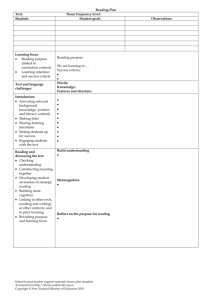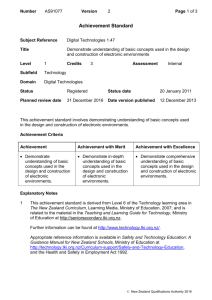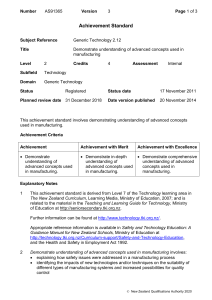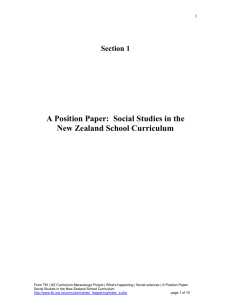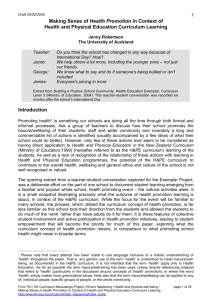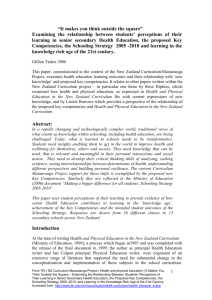Social Sciences Consultation Paper - NZ Curriculum Online
advertisement
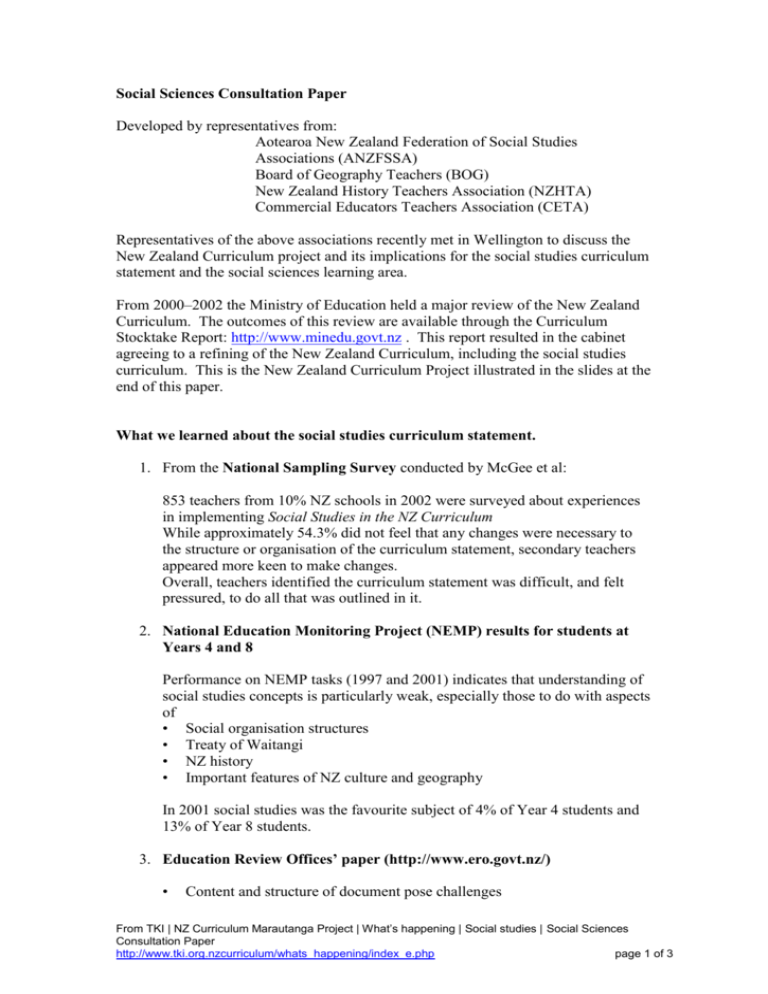
Social Sciences Consultation Paper Developed by representatives from: Aotearoa New Zealand Federation of Social Studies Associations (ANZFSSA) Board of Geography Teachers (BOG) New Zealand History Teachers Association (NZHTA) Commercial Educators Teachers Association (CETA) Representatives of the above associations recently met in Wellington to discuss the New Zealand Curriculum project and its implications for the social studies curriculum statement and the social sciences learning area. From 2000–2002 the Ministry of Education held a major review of the New Zealand Curriculum. The outcomes of this review are available through the Curriculum Stocktake Report: http://www.minedu.govt.nz . This report resulted in the cabinet agreeing to a refining of the New Zealand Curriculum, including the social studies curriculum. This is the New Zealand Curriculum Project illustrated in the slides at the end of this paper. What we learned about the social studies curriculum statement. 1. From the National Sampling Survey conducted by McGee et al: 853 teachers from 10% NZ schools in 2002 were surveyed about experiences in implementing Social Studies in the NZ Curriculum While approximately 54.3% did not feel that any changes were necessary to the structure or organisation of the curriculum statement, secondary teachers appeared more keen to make changes. Overall, teachers identified the curriculum statement was difficult, and felt pressured, to do all that was outlined in it. 2. National Education Monitoring Project (NEMP) results for students at Years 4 and 8 Performance on NEMP tasks (1997 and 2001) indicates that understanding of social studies concepts is particularly weak, especially those to do with aspects of • Social organisation structures • Treaty of Waitangi • NZ history • Important features of NZ culture and geography In 2001 social studies was the favourite subject of 4% of Year 4 students and 13% of Year 8 students. 3. Education Review Offices’ paper (http://www.ero.govt.nz/) • Content and structure of document pose challenges From TKI | NZ Curriculum Marautanga Project | What’s happening | Social studies | Social Sciences Consultation Paper http://www.tki.org.nzcurriculum/whats_happening/index_e.php page 1 of 3 • • • Teachers lack knowledge and confidence in constructing quality programmes Processes are poorly understood and implemented Curriculum integration is weakening social studies. 4. Australian Council of Educational Research’s paper August 2002 This paper stated that Social Studies in the New Zealand Curriculum is the most unsatisfactory of the curriculum statements examined. The structure of the achievement objectives does not provide teachers with sufficient advice to implement programmes that fulfil the aims of the learning area. The Curriculum Stocktake report identified that the following themes are important considerations: • • • • • • Social cohesion Citizenship Education for a sustainable future Bicultural and multicultural awareness Enterprise and innovation Critical literacy What does the New Zealand Curriculum Project mean for the social sciences learning area? we need to become involved in the process to refine the New Zealand Curriculum; the Ministry of Education invited teachers and educators to register their interest in the project in a recent Education Gazette (20 October 2003) local associations have been holding conversations about the project and the social studies curriculum statement in local regions. The Key Messages of the New Zealand Curriculum Project are: • reduce, refine, revitalize and participate. By May next year two draft essence statements need to be written: one will be very brief like the examples included; and one will be a revision of what is currently on page 14, New Zealand Curriculum Framework. The following examples of draft essence statements have been written to illustrate what a brief essence statement looks like. The aim of social sciences education is to develop New Zealand citizens who understand the economic interactions, historical events and geographic processes that shape their society and to equip them to make decisions as informed citizens about the future. (Gregor - do you want your name linked to this?) From Graeme Aitken: From TKI | NZ Curriculum Marautanga Project | What’s happening | Social studies | Social Sciences Consultation Paper http://www.tki.org.nzcurriculum/whats_happening/index_e.php page 2 of 3 The social sciences aim at enabling students to become critically and constructively involved as citizens at local, national and global levels through: a) developing understanding of: the significance of place and the past for communities and societies the organisation and functioning of communities and societies and their impacts on people lives b) participation in meaningful political, social and economic decision-making experiences that build analytical, dialogue and self-reflection skills. Are there any more to include? Timeline of process From May, 2003 Conversations held throughout New Zealand about the New Zealand Curriculum project and the social studies curriculum statement and the social sciences learning area. This has included the subject national associations, local associations, teachers and teacher educators. By May 2004 the two draft essence statements must be ready for circulation and comment. By mid 2004 a revision of the achievement objectives in the social studies curriculum statement is underway. It is expected that there will be wide consultation and involvement. On TKI (Social Sciences kete) a social sciences learning community through a commsuite will be established. From TKI | NZ Curriculum Marautanga Project | What’s happening | Social studies | Social Sciences Consultation Paper http://www.tki.org.nzcurriculum/whats_happening/index_e.php page 3 of 3

